Far Away Eyes’ Deeper Look Supernatural 11.19 “The Chitters”
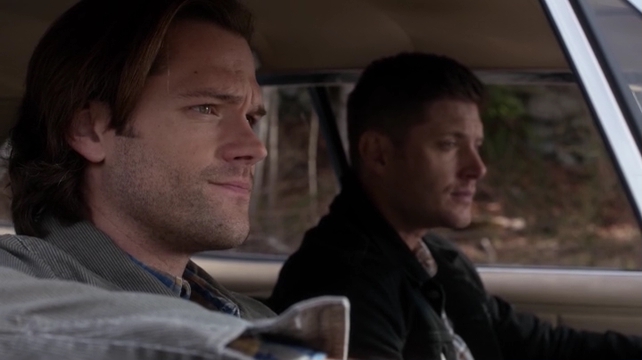
The finish line. At this stage of every Supernatural season, we inevitably come to the approach of the season long finish line. Sam and Dean must face their season long foe—be it Azazel or Lilith or the Mark of Cain. Sam and Dean are racing against time and a foe with the hopes that when they finally defeat said foe—this season in Amara and Lucifer—that they can finally take some time and perhaps move forward. It never seems to work out that way for the brothers, however. In “The Chitters,” the Winchesters are confronted with that very question. What will do they do after they’ve completed the task of defeating the Darkness? What will “living” mean for them afterward? Most likely—taking show history into account at least—that future will mean facing yet another foe. And yet, one can’t help but take in this case, Sam and Dean’s encounters with Jesse and Cesar and wonder how the brothers would answer the question about “hanging up our spurs.” After all, they watch that very story unfold with these two hunters—and while Sam and Dean still have awhile to go before the end of this fight with Amara, it can’t help but have crossed their minds.
So, what does the finish line mean for them? Does it truly mean settling down? Does it mean turning their back on hunting? Sam and Dean have spent their entire lives on the road. They’ve spent their entire lives looking for monsters. Despite their separate experiences with “normal” life, inevitably each one has been pulled back into the hunter’s life. In some ways, it can be argued that their dalliances with “normal” have left them wanting. In some regards, Sam and Dean only seem completed when they are on the job, working side by side in a common cause to stop a supernatural threat.
And yet, we can’t help but wonder what Sam and Dean would do if they were no longer facing a global threat? What would the Winchesters do if they were able to pick and choose their hunts without a shadow hanging over their head—without the drive to stop some massive or Biblical threat? Would they keep working? Would they—as Dean so aptly put it—continue down “crazy street” and chase after all the hunts that intrigue them? It’s easy to see that they’d both say yes to that question. There’s nothing either would rather do than continue working together—and without having to save the world in the process they could finally do focus on their motto of “saving people, hunting things, family business” in earnest.
Let’s start with the case itself.
The brothers, once again stuck in any search for the Darkness, Lucifer, or Castiel, must find something else to occupy their time. If they don’t, inevitably they will go crazy, get sloppy, or make a mistake. Sam knows that they must work—which is why he pushes Dean gently with some teasing. He reminds him that “sitting is the new smoking” and points out the strange case they can work. The case is bizarre in nature. Several individuals in town are going missing in the nearby woods. The few witnesses describe a strange phenomenon. Their friends are no longer their friends. Something has changed them. They now make strange sounds and have unusually green eyes. One of the creatures is described as “not having a penis” “or anything at all.” “Orgy-like behavior” is ascribed to the victims as they go into frenzies. The whole case is a new one for the Winchesters, and they’re not entirely certain what they’re even dealing with.
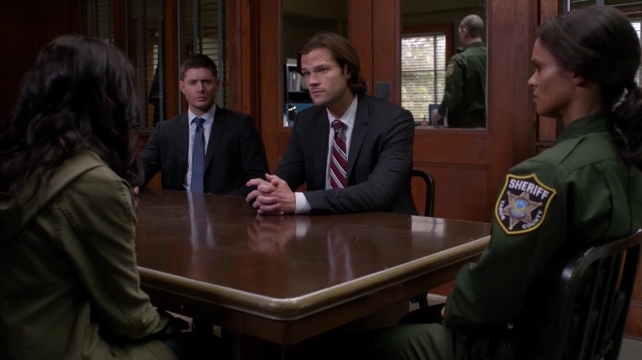
All they know is they must stop it if they’re to save this town from enduring another long cycle with more missing and dead in the decades to come. Sam and Dean sympathize with the witnesses. They understand the frustration the current sheriff has. So, they try to do what they can to figure out what they’re facing. It’s the only way they’ll be able to make a difference. Even so, along the way, it provides each brother with the relief they seek, too. Their conversations with one another are light and airy. They’re full of humor. The tension that builds when facing something like Amara or the stress about Castiel’s fate falls away.
That becomes evident when Sam says, “Hold up. We’re not actually gonna go with ‘Junkless’ on this, are we?” It also emerges when Dean teases Sam about his one-time experimentation with weed. He remarks, “Sinner.” It’s all insider jokes between the brothers. It’s their relationship finding balance as they settle into a case with a chance of success. They may not be able to “kick karma” in the teeth when it comes to Amara, but they can certainly solve this and save some people.
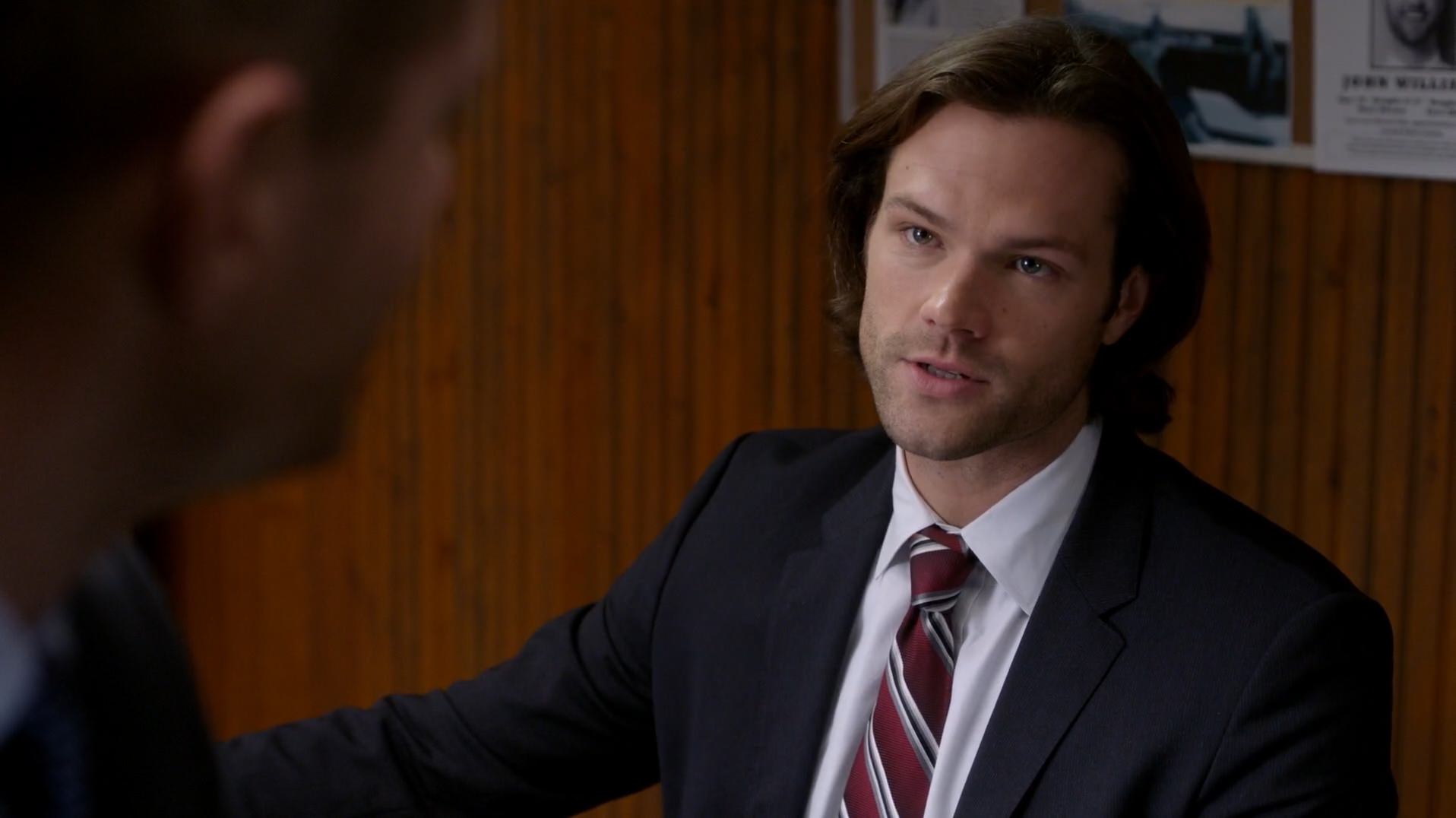
It isn’t until they’ve split up to investigate that answers start to emerge. As Dean looks over the forest, he encounters one of these victims. The strange rattling sound comes from them and as he nears, it turns flashing the telltale green eyes. Distracted by how odd this is, another creature lunges from the darkness to attack Dean. As he fights the creature, he’s rescued by another man named Cesar. He’s been hunting these bisaan for nearly thirty years and can help the Winchesters. And he’s not alone. With him is Jesse, a man who has been personally scarred by these creatures. They tell the brothers that these creatures are cicada-like. They cannot mate on their own and so they will take over human hosts. Their take-over is described in detail—they crawl into their victims “like a hermit crab climbing into a shell—only they don’t care the shell is not empty.” The urgency of the case also forces the Winchesters to split up—one will continue with Cesar, the other with Jesse.
Along the way, each brother will learn something from them.
As they get to know one another, Cesar corrects Dean’s assumption that they’re brotherly in their banter and quarreling. He tells him, “More like an old married couple.” The two have been together for quite some time—all in a search to eliminate the very creatures that once killed Jesse’s brother back in 1989. Cesar understands the drive Jesse has. He knows that they must do everything they can to stop the next cycle—which won’t be until twenty-seven years from now. He knows that this is the white whale for his husband. He knows that it’s tearing Jesse up to be in his hometown where no one believed him. Given a chance to work with Dean alone, he expresses his fears about Jesse. Revenge may only get them both killed—evidenced by his answer to Dean’s question, “What’s it like settling down with a hunter?” “Smelly, dirty. Twice the worrying about getting ganked.”
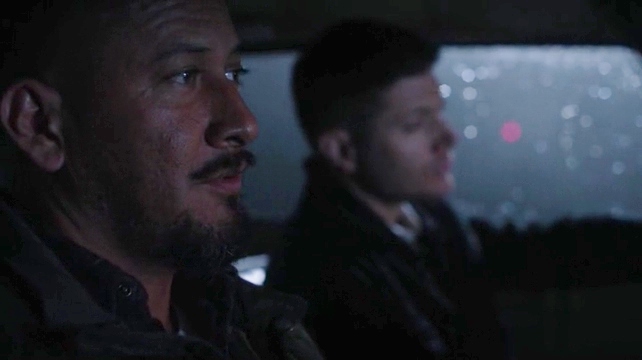
He confesses to Dean, “I never had a brother or a sister but I’ve seen it over and over. Someone lose someone when they’re young—it never heals over.—How many hunters have you seen over the years get their revenge?—They are never fixed, are they?”
For Cesar, this case is personal. He’s not the one needing closure about a loved one. Instead, he’s concerned by how far Jesse is willing to go. He’s worried they’ll be caught in another thirty-year cycle, waiting for a chance to come back and put this to rest. The finish line for him and Jesse is so close—and yet so far away. If they don’t find the burrow tonight and stop the creatures from disappearing again, he knows that it’ll consume Jesse—it’ll “eat him alive.” That is a painful thing to watch and he isn’t certain he can go through it. He loves Jesse and wants to settle this now. He wants Jesse to get what he wants out of this case—revenge—but afterward, he hopes that this will truly be what his husband wants. These creatures could steal the most important person away from Cesar—at least emotionally—if they don’t succeed.
It’s why he fights so hard alongside Dean as they’re jumped by other creatures. He knows they are racing a clock and he doesn’t want to bungle their chance. Cesar will not give up on Jesse’s quest—but it doesn’t mean he has to like it. There has to be more to life than simply chasing after monsters in the dark to exact revenge on the one that stole a loved one. He is torn up by how hard it is to see Jesse twisted up by what happened to him when he was twelve. It’s clear that Cesar seems to enjoy the work on some level. He’s level-headed and efficient in the way he handles himself and his weapons. He’s not about to go half-cocked into any situation and risk anything important. Cesar knows that this is a job and not really his life. He simply wants his husband to have peace. He wants Jesse to be able to put this particular nightmare in his past—their past. And so, until such time that they’ve done it, Cesar will be patient and steadfast in his support. He’ll do the work and follow the leads and do whatever it takes.
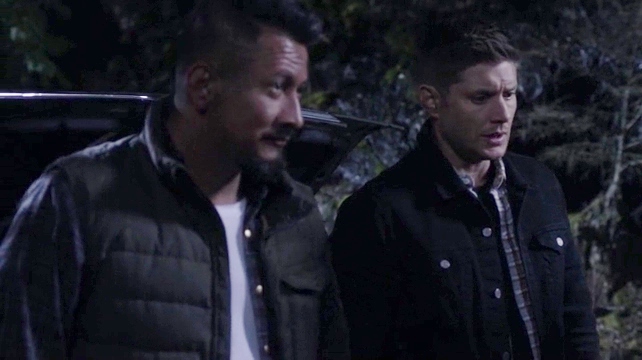
In many ways, he reflects so much of Dean’s own understanding of the life. Dean may have certainly felt more like Jesse has in the past, but he has also kept his head down to do the job and to do it because of family. He started the hunt first for his father and carried it on for his brother and in many ways Dean would love nothing more than to perhaps put hunting behind him—or at least a certain caveat of hunting behind him. He’s clearly been at this for so long that any other career path would bore him—and has as evidenced by how hard it was for Dean to be a civilian at the start of season six. Rather, Dean dreams more about putting something else in the rear-view mirror when it comes to hunting. He’s explicitly said it several times throughout the last few seasons, and in many regards Dean would like to make those words stick after this business with Amara and Lucifer is over with.
After all, “we are not the only hunters on the planet.”
Dean would love more than anything to go back into hunting without the world’s fate hanging in the balance. He would like to go back to doing the job just to do the job. Sam may have had to drag him out on many of these cases throughout this season as they’ve been searching for answers about Amara, but it is clear that once he’s on the job and working the case that Dean thoroughly enjoys the work. Here he can make a difference. Here he can help someone. He can save lives. Dean is his most powerful when he’s busy and working to solve a case. It’s his element and he knows it even if he doesn’t voice it or protests the time it takes away from the main season goal. Dean wants to hunt and life for him will always be a hunter’s life—but the key difference is the reason he’s doing it or the overarching reason he’s doing it.
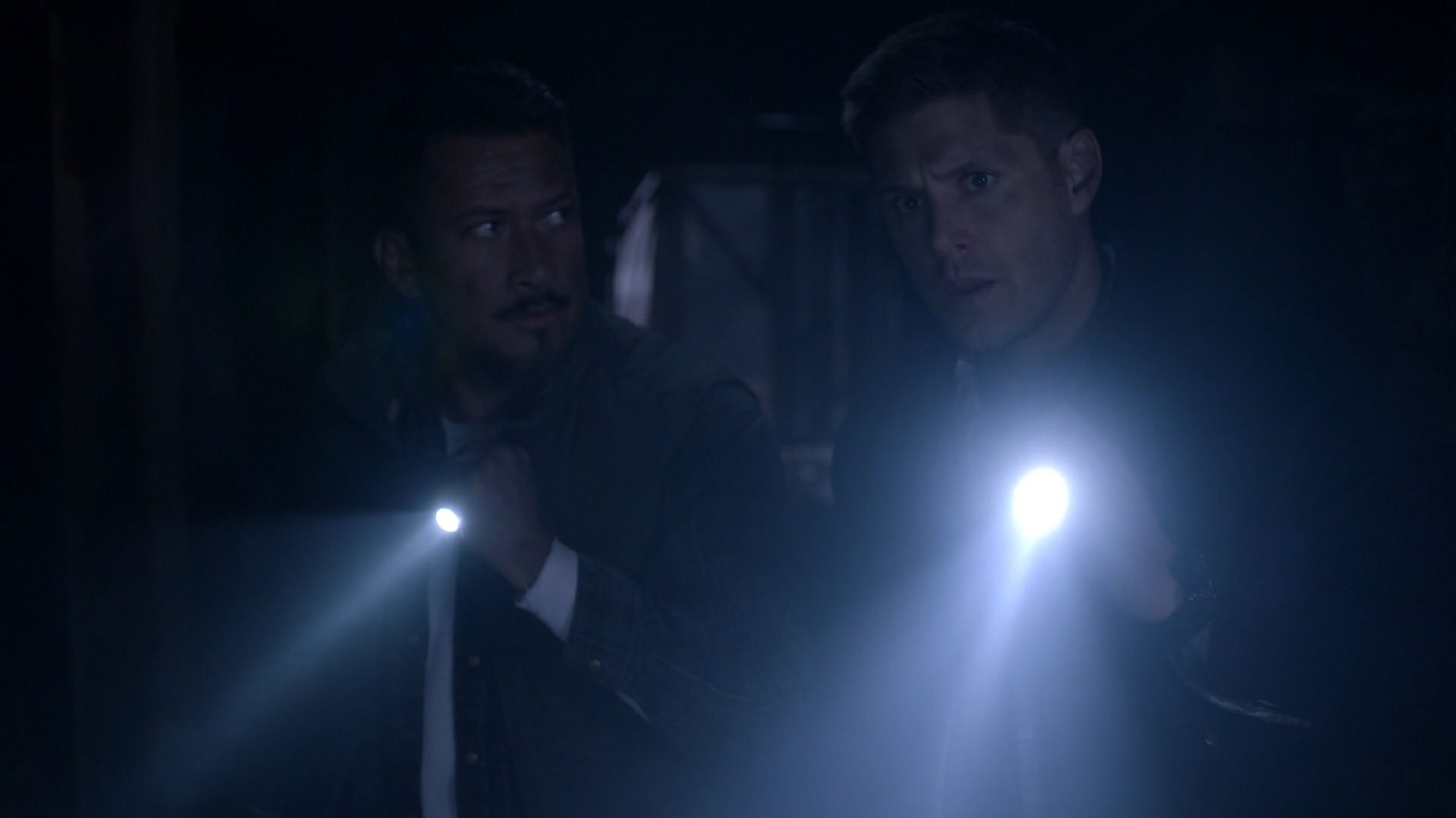
It’s also apparent that Dean envies what Jesse and Cesar share. No, he doesn’t begrudge them their openness or their closeness. He wants what they have for him and Sam. He wants to be able to work the jobs and follow the hunt with Sam. There’s never been a question that Dean is happiest when hunting with his brother. Minus all the stress and pressure of facing down a worldwide threat and it’s easy to see that Dean would gladly settle into a partnership with Sam the way that Jesse and Cesar have with one another. While there’d be key differences—most obvious that Cesar and Jesse are husbands and Sam and Dean are brothers—the effortlessness and ease with which the married hunters worked together could easily translate to Sam and Dean’s partnership. It’s also one reason why Dean is so eager to help them out. Their relationship is something worth fighting for and saving from these creatures.
Most of all, Dean would like very much to not go from one mess to another—solving one problem only to create another as they have with the removal of the Mark and the release of the Darkness for instance. Dean would like to wrap a case and be able to put it in the win column—which is exactly what a case like “The Chitters” allows.
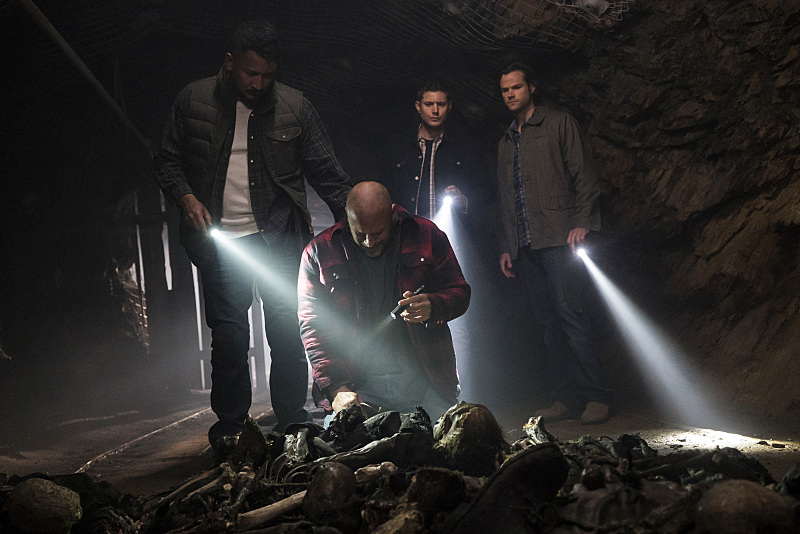
As they’re searching the woods for the burrow, Dean finds it and alerts Cesar. When Sam and Jesse arrive, they can all stop the next cycle together. This time, the eggs won’t simply be left dormant to hatch. This time, they’ll manage to snap the unending cycle and release this town from its dark threat. And even if it means seeing Jesse’s grief up close as they discover his brother’s remains amongst the bodies in the nest, Dean knows that they’ll have been able to bring closure and peace to another that has suffered due to a supernatural force.
All of these things makes Dean pause. He knows from working with them on this case that they’re smart and capable. He knows that Cesar and Jesse may have fresh eyes and an understanding that he’s not seeing so blinded by the rut he’s been in. Perhaps he could ask them to take a look at what they’ve found about Amara. Perhaps they’d have some advice to give on how to stop it or an answer he hasn’t thought about.
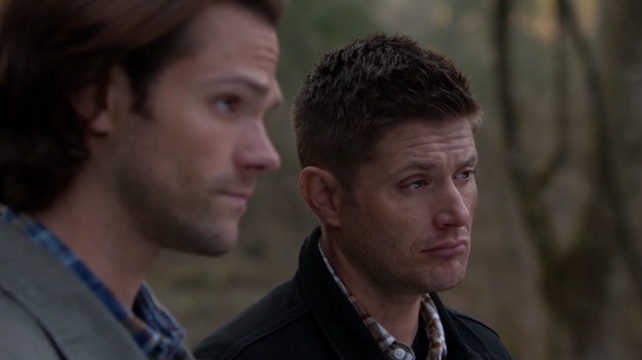
It isn’t until Sam asks them what they’ll do next and Cesar mentions hanging it up that Dean wavers on that decision. He knows that they’ve managed to reach a finish line. Dean knows and understands for him and Sam there will always be another. They will always be hunting something. Seeing these two achieve what they haven’t, however, makes him unable to ask for their help. He has no desire to drag them into the endless cycle that they’ve been in. No matter how many times they pull the world back from the brink, another crisis pops up and Dean refuses to drag anyone else into that mess with them if he can help it. He’ll let them go off and pursue life post hunting.
And yet, Dean isn’t the only one that learns this lesson in the episode. In many ways, Sam has to learn the same lesson. He learns it alongside Jesse. While Dean’s focused so heavily on the fight to save the world from the latest crisis, Sam had to confront so much of Jesse’s grief—and in a large part his own. After all, Sam has never quite gotten past the times he’s lost Dean—particularly in the “Mystery Spot,” or Dean’s deal coming due. It’s what drove his every action in removing the Mark. It’s what has driven him to fight so hard to save Dean and stand with him this season. He knows that the threat they faced last season has merely morphed. He knows that the Mark and its evil is forever banished—but in its place has risen Amara’s threat. Sam still struggles with what that means and how he can stop it so his brother will be safe.
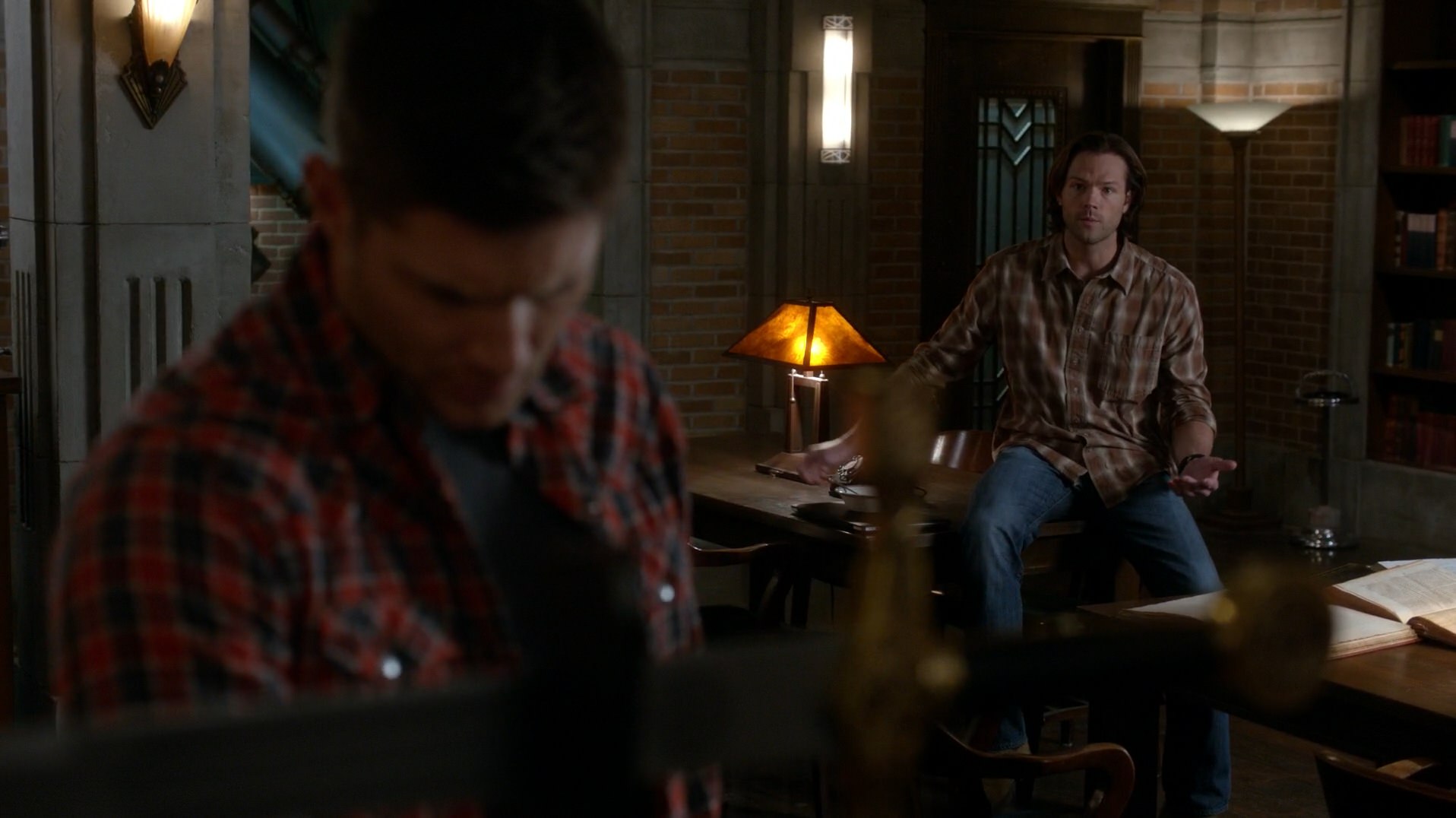
Despite all of his attempts and speeches about doing things differently, Sam is still tied to saving his brother no matter what. That fact is thrust upon him here as he witnesses Jesse’s tragic story—hearing first hand how difficult it was for him to have lost his brother and to be helpless. It begins in their car ride to the cabin. They’re on their way to confront the retired sheriff. Jesse, wound tight by the case and its implications, opens up to Sam about what happened all those years ago. He’s from this area. He grew up in this community. The scars of what has happened are fresh and at their rawest while they’re so tantalizingly close to finally finding answers about his brother, Mattie, and putting an end to this bisaan’s threat.
He can understand the guilt Jesse invariably carries, too. He confesses to Sam, “I must have stumbled around searching for Mattie for ten, twenty minutes—shaking panicking, told myself I had to focus, find him, and I did—those green eyes staring at me. It wasn’t human. Took off and didn’t look back. Everybody in town, including my mom, thought some pervert had taken him. She was falling apart, crying. Why didn’t I remember what the guy looked like. Why was I making up this lie—Moved as soon as she could. Still thinks I should have done something. Saved him. Everybody did. They couldn’t accept a lot of things—but Mattie did. He was a great brother.”
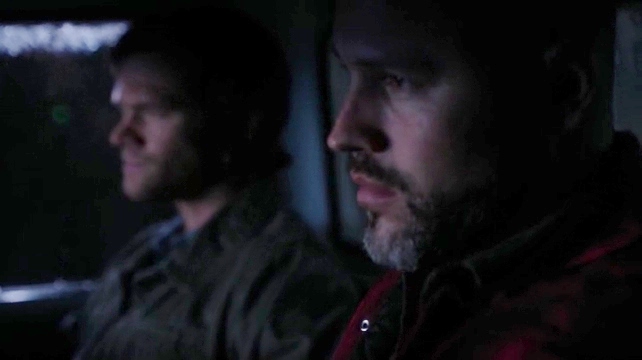
It is the guilt of not doing enough—of not knowing the answers or what to do next—that strike Sam. It’s in his face, the gentleness of his voice as he empathizes with Jesse’s plight. He’s been in this man’s shoes and endured this pain. He’s witnessed his brother being taken from him too many times and the salt in that wound is rubbed raw all too often. Even so, Sam sees this case as an exemplary for what he and his brother will do when they’re no longer tied to saving the world—when they’ve crossed their very own finish line. He sees them working cases just like these. He sees them doing what it takes to help someone like Jesse put a tragic story to bed and to find the much-needed closure.
The emotional impact of talking with the sheriff strikes deeply into Sam’s heart, too. He can see that this man is just as broken and battered by grief. It’s in every gesture, the withered body language, and the weary voice. This sheriff has been haunted ever since he came up against these bisaan and lost. Jesse, raw with grief, is taking it all out on this broken man. He starts gently, stating, “Joe, please, I was twelve when my brother got taken. I never got over what I lost that day. One person in the whole world I loved the most.” These words are powerful and impactful to all the in the room—and pierce Sam deeply. He’s uttered similar words. This case has become increasingly personal—and he knows that this is his chance to help someone in need. This is his chance to live by the credo of “saving people” even if it means only putting someone’s remains to rest and putting a nightmare firmly in the past. Working an emotional case like this can truly put things into perspective for Sam here. It is this reason he continues to hunt—regardless of the latest world-wide crisis they face.
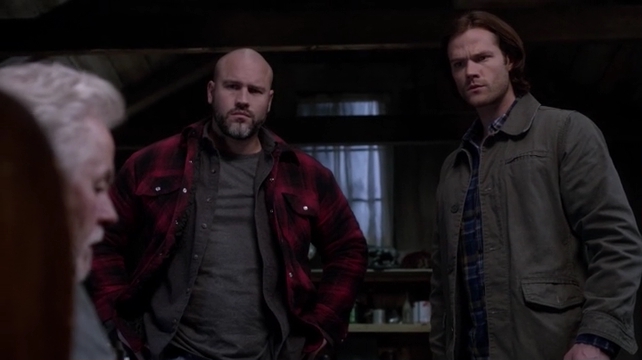
Jesse had been a child when his brother had been brutally taken away from him and now he can finally tell the man he holds responsible what he thinks about his inaction. After all, the sheriff hadn’t listened to him. He had tried to convince Jesse that it was all in his head. It turns out that the sheriff had known the truth all along. He, too, had been a victim of these bisaan’s. He lost his daughter to them in the same cycle that Jesse had lost his brother. He states, “I don’t know what happened. She was one of them. All the missing people were scattered around dead. I think she and that other thing had killed them. I tried, I tried talking to her but she attacked me like some rabid wolf—teeth like thorns. I killed her.”
Sam knows exactly how Jesse feels in this moment—knows how Jesse will never quite get past that pain. He knows that Jesse has forever lost his big brother and that the wound has now been made raw by this sheriff’s admission. If only the authorities had listened to Jesse then. If only they had done something—maybe they could have saved his brother. The what ifs are heavy in the air in this moment and it is clear that Sam is soaking this up as he tries to come between them. He’s been in Jesse’s shoes too many times in the past—and yet he’s also managed to be lucky enough to keep his brother at his side. Confronting Jesse’s grief reminds him of the tenuous grasp they both have on their brotherhood as hunters.
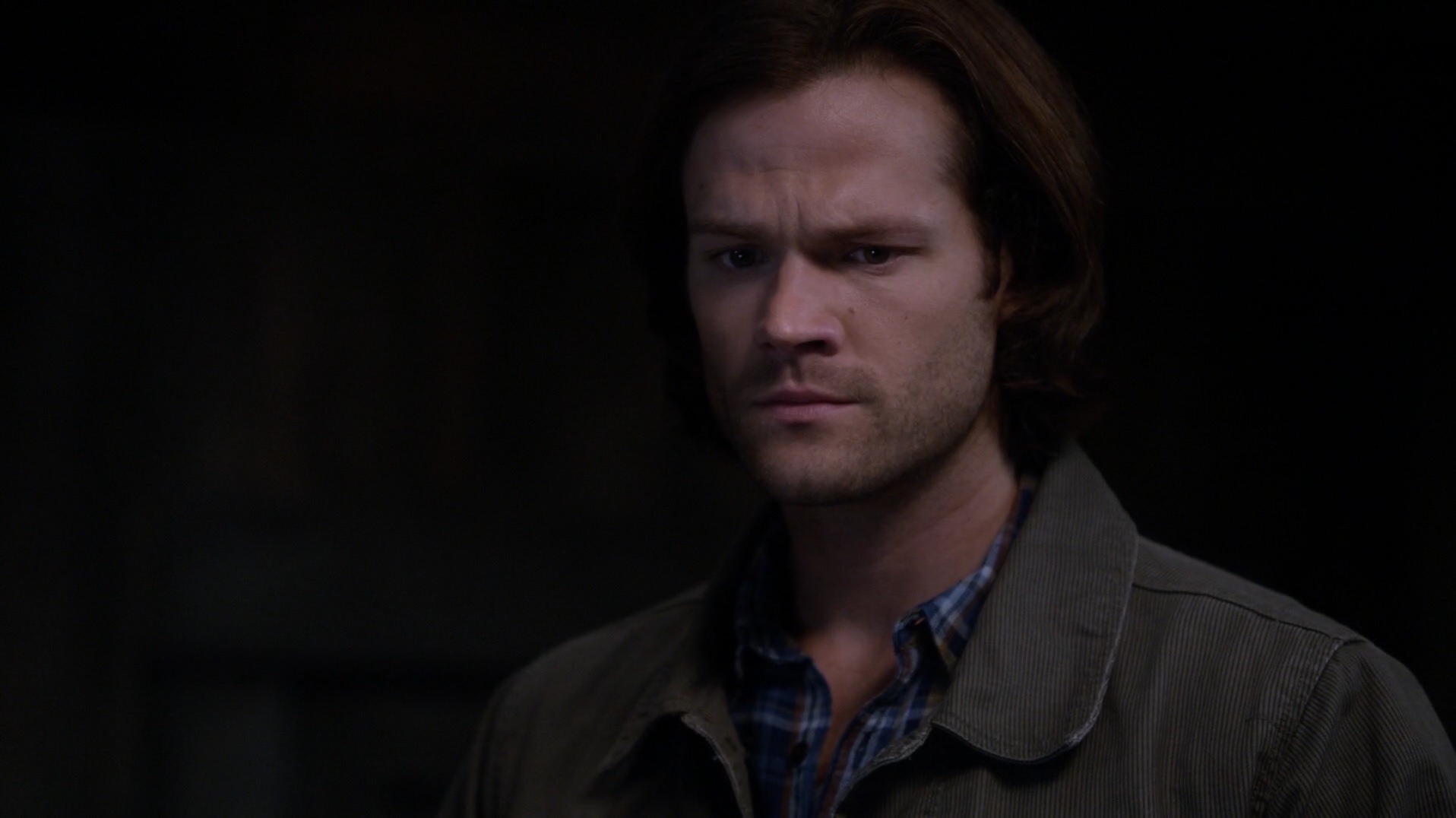
Instead of soothing Jesse’s anger, it only makes it flare brighter. He shouts, “No. You didn’t want to say that your kid was one of them. A monster. And that you killed her. You killed her.”
Sam is stunned and caught up in the emotion, even from his mediator stance. He asks softly, “What did you do? What—did you just erase her from your life? Pretend that she went away somewhere?”
Exposed and battered by his emotional confession, the sheriff tells them where he tracked his daughter down. He knows where the nest is. He knew all along. Now, all they have to do is head to the mine and end it. This is Sam’s chance to help another hunter reach that finish line and to put to bed the grief that has consumed him for so long. It gives Sam a chance to help another hunter move forward and past this moment in time to the next stage.
And yet, Sam can’t help but think about what that finish line might mean for him, too. If Sam is ever pressed to answer that question, it’s clear that he’d say it’d be hunting with his brother. It is one thing to be stuck under the cloud of another world-wide catastrophe—feeling responsible for the mess made and the clean up required. It is one thing to be chasing after leads and worrying about the fates of friends and allies and innocents caught in the crossfire all along. Sam has been there so many times stuck trying to face down those threats—both on a global and personal scale.
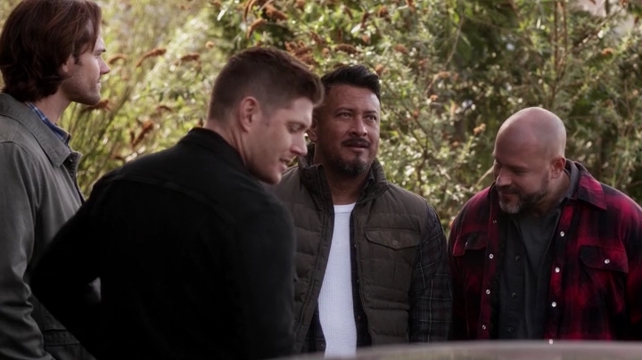
He’s also come to terms with the notion that he is a hunter for life. He’s expressed this sentiment clearly at every turn throughout the past couple seasons. He told Charlie that this was his life. He told Eileen that he can’t imagine doing this without his brother. For Sam, reaching the finish line means perhaps finally being able to hunt just to hunt. It means truly living by the credo of “saving people, hunting things, family business.”
In the second episode of the series, “Wendigo,” Dean charges them with the task of picking up where their father had left off. He asserts that it is their job to make it so others won’t have to endure what they have. It is their knowledge that will allow them to save others from supernatural threats. In many ways, Sam has spent the entirety of season eleven reminding his brother of that very idea. The finish line may manifest itself in defeating Amara, stopping Lucifer, and perhaps rescuing Castiel—but for Sam the after is quite clear. He sees it as their chance to make a difference and to save others on a case by case basis. He sees it as their chance to settle into a life that makes them both feel satisfied.
Without a big bad to face, without an Apocalypse to stop, Sam won’t have to drag his brother out practically kicking and screaming. After all, time and time again, Sam has seen his brother bloom when in the midst of a hunt. He can tell that Dean feeds off the positive energy of a case won. He can tell that his brother enjoys the work once it is underway. It is an energy Sam needs to feed off, too. He can sense the accomplishment as he and Jesse arrive at the forest and trek with Dean and Cesar to the nest. Here Sam can truly help Jesse put this pain in the past. He knows that this will be a scar for Jesse for the rest of his life—and yet it won’t be the raw wound anymore. It’s the very reason he pushed to take on this case—even before he knew that he sought it.
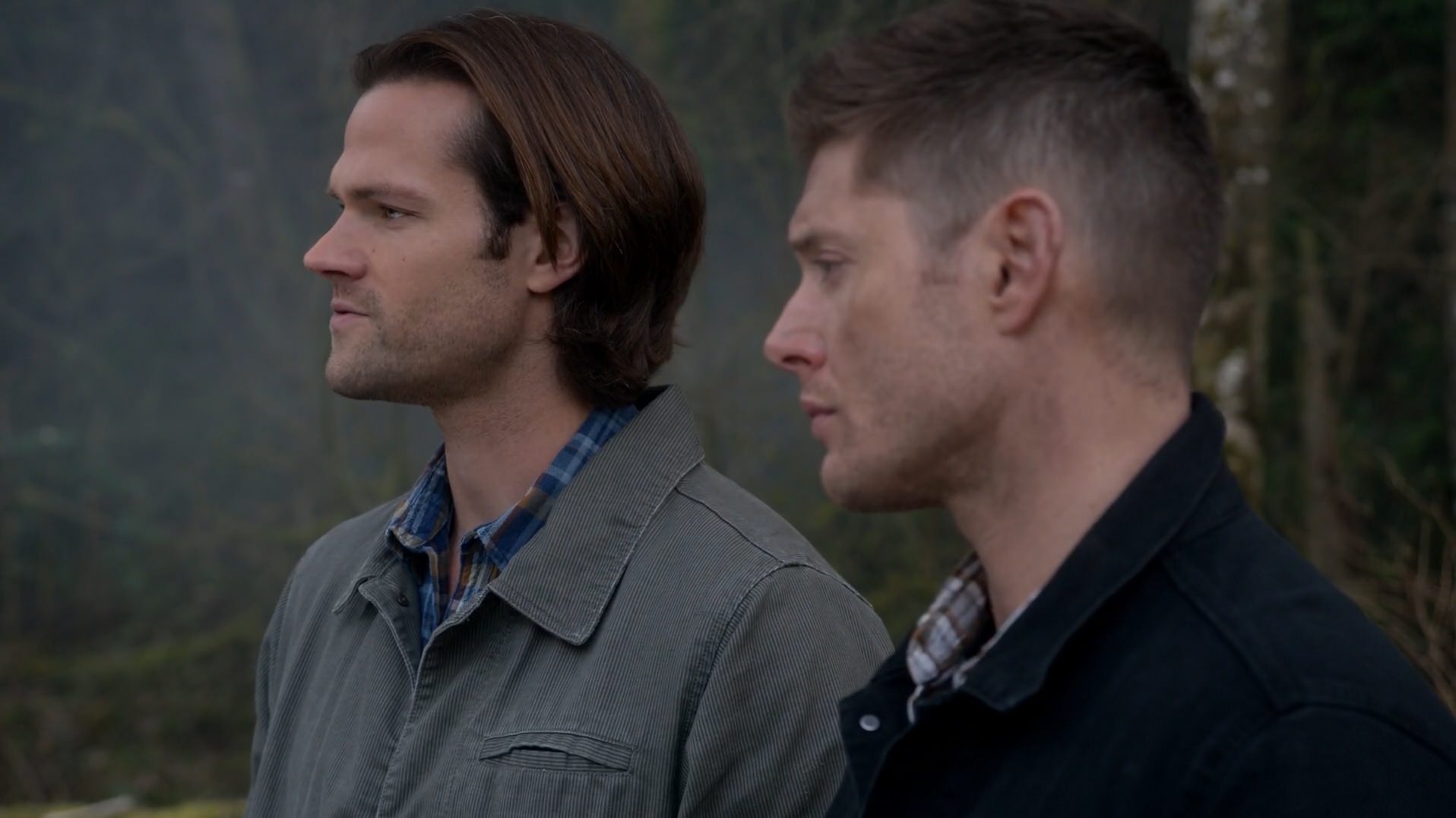
Even so, Sam can’t help but be reminded of those times he’s lost his brother and how much it stings as he watches Jesse and Cesar say their goodbyes to Jesse’s brother. He knows how their life could go. He knows how short a hunter’s life can be. He knows that death could have come for his father and brother at any time. And so, he quietly confesses, “You know… whenever you and Dad used to leave me to go hunting and I — and I wouldn’t hear from y’all for a while, I, um, I was always sure that some vamp or rugaru or take your pick… I always figured one of them finally got ya. I tried to think of what to do, you know, the next step to take. I was just lost.”
In many ways, Sam knows he could have been like Jesse—and has been like Jesse in the past. He knows how lost he would feel in life without his brother—and doing what they do would most likely no longer be an option without Dean at his side. Reaching the finish line this season is key for the brothers—but that finish line doesn’t mean hanging up the spurs. They will not ride off into the sunset or set up a ranch or simply settle into civilian life. They will do the job they’ve been doing their whole lives—perhaps with a renewed purpose and understanding.
Instead, it means committing to “saving people, hunting things, family business” on a case by case basis. It means hunting together as brothers and facing these threats down as a team. It means not having to worry about a crisis looming over the horizon as yet another global threat attempts to destroy everything. It means simply being the Winchesters and carrying on the work they both love.
In the end, that’s all either of them have truly wanted. In the end, it is that hunter’s life that Sam and Dean will fight for—and win.



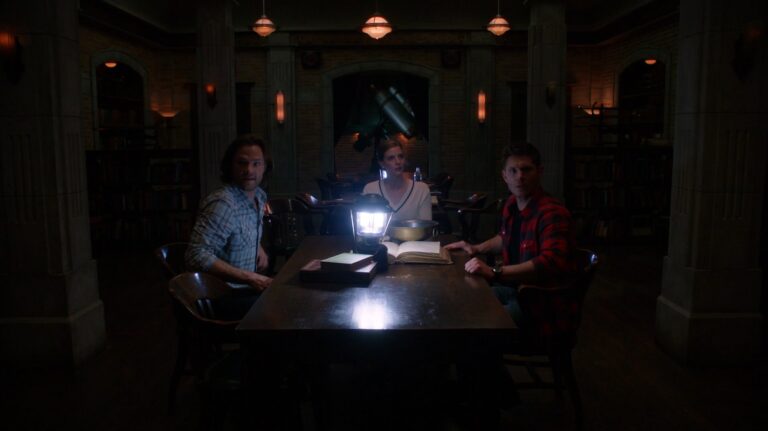

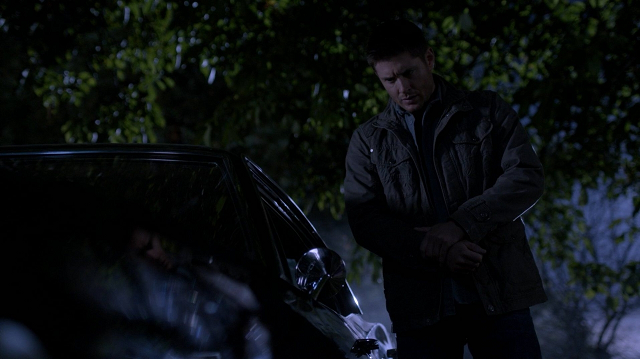
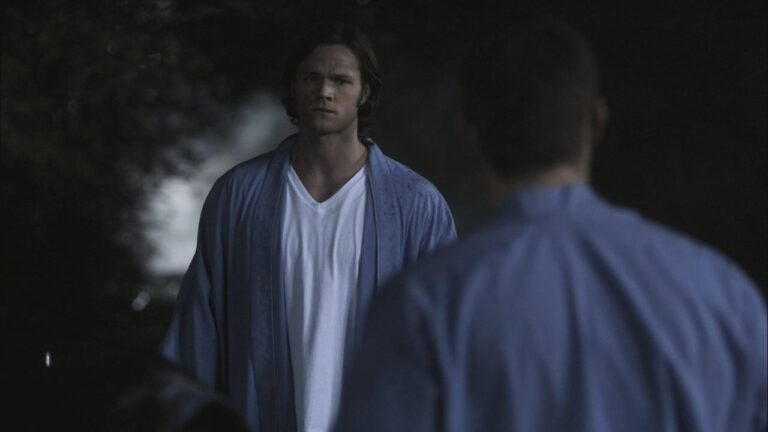
Leave a Reply